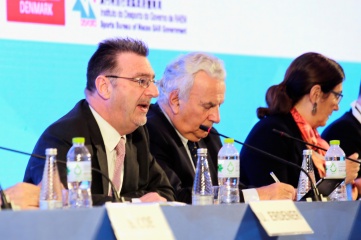[Source: ASOIF[] The General Assembly of the Association of Summer Olympic International Federations (ASOIF) convened today at SportAccord in Gold Coast, Queensland (Australia), and elected Marisol Casado (International Triathlon Union), Ingmar De Vos (International Equestrian Federation) and Morinari Watanabe (International Gymnastics Federation) as Council members for a four-year term of office. Whilst Marisol Casado was re-elected for another term of office, Ingmar De Vos and Morinari Watanabe will replace José Perurena (International Canoe Federation), whose mandate had also come to an end, and former FIBA Secretary General Patrick Baumann who tragically passed away last autumn. During a moment of silence, the General Assembly remembered Patrick Baumann and his outstanding contributions to sport and the Olympic Movement.
Marisol Casado was elected President of the ITU in 2008 and became an IOC Member in 2010. She is also a Council member of GAISF. Ingmar De Vos was elected President of the FEI in 2014. An IOC Member since 2017, he is also a GAISF Council member and GAISF representative on the WADA Executive Committee. Morinari Watanabe was elected President of the FIG in 2016. An IOC Member since 2018, he is also a member of the Tokyo 2020 Executive Board.
The future of global sport and the role of International Federations (IFs) were key topics on the agenda of the General Assembly. ASOIF’s report on the “Future of Global Sport”, launched in February this year, received very positive reactions during the meeting. A number of member federations stated that the report recommendations had gained momentum within their organisations and will be discussed at their upcoming Executive Board meetings.
ASOIF President Francesco Ricci Bitti said: “The future of global sport, the role of IFs and their governance are all intertwined. By examining these three aspects at the same time, we aim to strengthen our member federations and help them tackle current and future challenges in a fast-evolving world. I am very glad to hear they have started to make use of the report findings in their daily work and implement some of the recommendations.”
On the topic of IF governance, ASOIF members agreed on the procedure of the third governance review, to be conducted between late 2019 and early 2020, with the declared objective to see at least 26 of the 28 full ASOIF members score 120 points (out of a maximum of 200 points). In order to support this process, the ASOIF Governance Support and Monitoring Unit (GSMU), established in late 2018, will continue to help IFs achieve progress in good governance.
The Tokyo 2020 Olympic Games Organising Committee shared their plan for their one-year-to-go celebrations on 24 July this year and reported that they had released lately their competition schedule (session by session) to the general public. The recent launch of the ticketing sales website was hailed a success as well, with already more than two million ID registrations clocked by 31 March 2019. Tokyo 2020 also promised to collaborate closely with the IFs regarding the upcoming test events which will be important to fine-tune operations for Games time.
The Paris 2024 Olympic Games Organising Committee presented their new Event Delivery Model to leverage IF expertise for an optimal and cost-efficient Games delivery. They have already started to work closely with the ASOIF Olympic and Multi-Sports Games Consultative Group (AOMSG) and the IOC Sports Department and will also closely consult with each IF on their expectations for the Games’ delivery throughout the preparations.
During the report from the International Olympic Committee (IOC), ASOIF member federations were informed about the preparations for the Dakar 2022 Youth Olympic Games, strengthening the solidarity funding model for athletes, and the IOC’s Gender Equality Project. Based on the recommendations from the project, ASOIF has proposed to establish a new advisory group which will specifically focus on the topics of gender equality and diversity.
The World Anti-Doping Agency (WADA) updated the General Assembly about the latest status of the investigations related to Russia, ongoing governance reforms within the organisation as well as WADA’s work on a strong Compliance Monitoring Program and the 2021 Code and International Standards framework.
The General Assembly also approved the Olympic revenue distribution model for the Tokyo 2020 Olympic Games.


